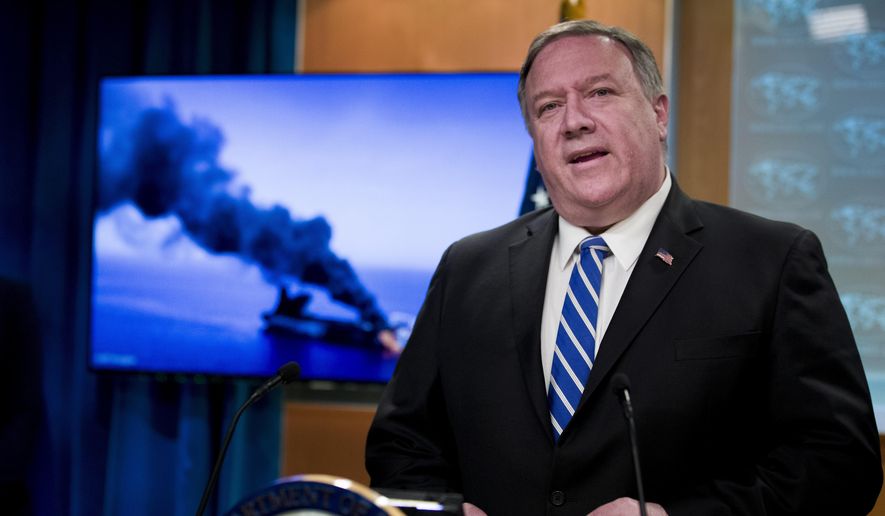The Trump administration says it is keeping all options on the table, including military strikes, in response to attacks on two oil tankers near the Strait of Hormuz last week that it claims were carried out by Iranian troops.
Speaking on “Fox News Sunday,” Secretary of State Mike Pompeo said it was “unmistakable” that Iran conducted the attacks “with the clear intent to deny transit through the strait,” through which about a fifth of the world’s oil is transported daily.
The Pentagon late Thursday released photographs and a grainy black-and-white video purportedly showing Islamic Revolutionary Guard troops removing an unexploded mine from the side of an oil tanker targeted in the Gulf of Oman earlier that day.
U.S. Central Command said American forces in the region witnessed and recorded an Iranian boat approach the oil tanker Kokuka Courageous and remove an unexploded limpet mine from the side of the vessel. The video footage released by the Defense Department appears to show a small device being removed from the ship.
Mr. Pompeo said the U.S. intelligence community has significant evidence to blame Tehran for the attacks. Iran has persistently denied such claims.
“The American people should rest assured we have high confidence with respect to who conducted these attacks, as well as who conducted other attacks within the last 40 days,” the secretary of state said.
U.S. officials said that limpet mines also were used in a May attack on four oil tankers, which the Trump administration also has blamed on Iran.
Not everyone, however, is convinced by the U.S. take on how the situation unfolded.
Germany’s foreign minister has requested additional evidence before pointing blame on Tehran and said the video released by the Pentagon is not enough to draw conclusions.
There also have been disputing claims about the attack. The Japanese owner of one of the tankers has told of his crew’s account of the incident and said the ship was hit by a flying object, not a mine.
Saudi Arabia, the world’s largest exporter of crude oil, and Britain have joined the U.S. in pointing fingers at Iran.
In an interview with Saudi-owned newspaper Asharq al-Awsat, Crown Prince Mohammed bin Salman called on other countries to take a “decisive stand” against the attack.
“The kingdom does not want a war in the region, but it will not hesitate to deal with any threats to its people, its sovereignty or its vital interests,” the crown prince said.
Britain plans to send elite military forces to the region in response to the attacks after the country’s foreign secretary declared that Iran is “almost certainly” responsible for the attacks, according to The Sunday Times.
Royal Marines are scheduled to be deployed to the region in coming weeks and are expected to patrol the strait, joining ships stationed at Britain’s naval base in Bahrain.
But the British Defense Ministry downplayed the significance of the move and told the newspaper that it is a “pre-planned training deployment and is in no way related to the ongoing situation in the Gulf of Oman.”
As tensions escalate between Washington and Tehran, Mr. Pompeo maintained that the U.S. does not seek war with Iran but will defend itself if necessary. The Trump administration has repeated that message for weeks since the Pentagon deployed additional forces to the region last month citing a threat to American interests.
In an interview with CBS News, Mr. Pompeo said the U.S. is considering a “full range of options” to respond to the attacks but is “confident [the U.S.] can take a set of actions that would restore deterrence.”
Asked whether such action would include a military response, the secretary of state responded, “Of course.”
Lawmakers in recent weeks have warned that the administration lacks congressional approval to use military force.
Mr. Pompeo on Sunday insisted that the administration “always [has] the authorization to defend American interests.”
“Every option that we look at will be fully lawful,” Mr. Pompeo said.
Congressional leaders, including House Speaker Nancy Pelosi, have said the White House cannot cite the 2001 Authorization for Use of Military Force to strike in the Middle East and have reiterated that only Congress can declare war.
Rep. Adam B. Schiff, California Democrat and chairman of the House Permanent Select Committee on Intelligence, said in an appearance on CBS that while he believes Iran is behind the attacks, “congressional approval is necessary to initiate hostilities against Iran.”
“We should be trying to corral a response, though, from the international community to protect shipping, to impose sanctions, but because we have so alienated ourselves from our allies, that’s not happening,” Mr. Schiff said.
Meanwhile, Sen. Tom Cotton, an Arkansas Republican who sits on the Senate intelligence and Armed Services committees, said retaliatory military strikes against Iran would be warranted.
“Unprovoked attacks on commercial shipping warrant a retaliatory military strike against the Islamic Republic of Iran,” Mr. Cotton said on CBS after Mr. Pompeo’s appearance.
Mr. Cotton said he believes the administration does have the authority to use military action against Iran without expressed congressional approval.
“The fastest way to get the fire and fury of the U.S. military unleashed on you is to interfere with the freedom of navigation on the open seas and in the air,” Mr. Cotton said. “That’s exactly what Iran did.”
• Lauren Toms can be reached at lmeier@washingtontimes.com.




Please read our comment policy before commenting.